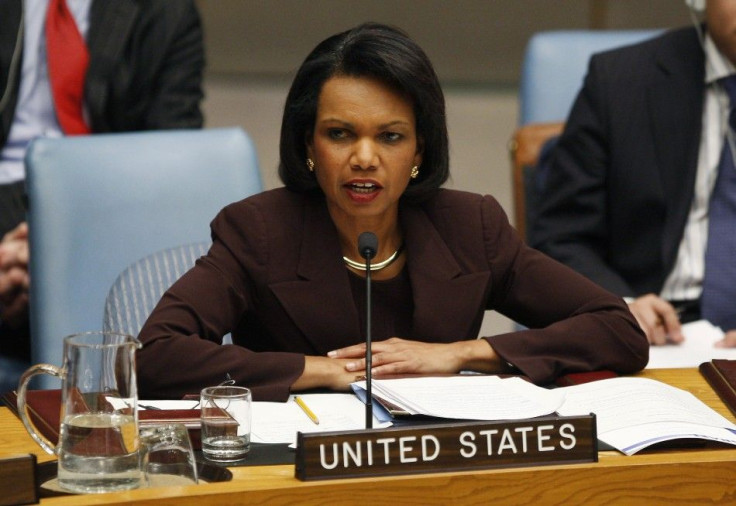Condoleezza Rice Book: 10 Things From 'No Higher Honor'

Former Secretary of State Condoleezza Rice published her book No Higher Honor: A Memoir of My Years in Washington on Tuesday. Here are ten things about Rice and her time in the White House serving under the George Bush administration.
On U2's Bono:
Rice credits the U2 singer with being a huge help to the White House with the work of the Millennium Challenge Corporation, which provides foreign aid. Rice wrote: I told him that it was his job to be the 'thorn in our side.' He performed that role admirably. She added that Bono really cared about the issues, and he was as well informed as anyone I knew.
On Moammar Gadhafi's crush:
The former Libyan leader had a bit of a crush on Rice, which she touches upon in her memoir. She wrote about a videotape he said he had made for her. It was a quite innocent collection of photos of me with world leaders -- President Bush, Vladimir Putin, Hu Jintao, and so on -- set to the music of a song called 'Black Flower in the White House,' written for me by a Libyan composer. It was weird, but at least it wasn't raunchy.
On immigration:
Rice wrote about the need for immigration reform. The most devastating failure in our dealings with Mexico had less to do with foreign policy than with domestic affairs, she wrote. She added that she does not recognize my country when people talk of denying citizenship to the children born here of illegal-immigrant parents. I don't see why we should continue to educate engineers and scientists and scholars from around the world -- and then send them home.
On Hurricane Katrina:
Rice wrote that she told the President they had a race problem after turning on the television while on a break in New York City and seeing that most of the people devastated by Katrina were black. She said she could not believe she had missed the mark when it came to the hurricane. I wasn't just the Secretary of State with responsibility for foreign affairs; I was the highest-ranking black in the administration and a key advisor to the President. What had I been thinking?
On Guantánamo Bay prison:
Rice wrote that then-president George Bush was blindsided and angry when photos showing U.S. soldiers abusing prisoners were aired on 60 Minutes II. Bush had recently been told about the abuse and the photos, but he had not seen the latter. She wrote about how conditions at Guantánamo were improved and that a Belgian official said it was a model prison. She noted recidivism among released prisoners. This underscores the difficulty of fighting the war and simultaneously acting on our international obligations concerning detainee treatment, she wrote. It was a balancing act, and I believe that we eventually got it about right.
On the empowerment of women:
Rice touched upon this topic and how she worked on it with Ambassador Shirin Tahir-Kheli. Societies that treat women badly are dangerous societies, she wrote. The empowerment of women is not only morally right, it is also practical in the positive impact it has on so many social ills. Rice also pointed out that some United Nations peacekeepers had been accused of rape. Before our efforts the United Nations had been slow to shine a light on its own transgressions, Rice wrote.
On Dick Cheney's vice presidential staff:
Rice wrote that Cheney's staff seemed very much of one ultra-hawkish mind. Rice wrote that while Cheney and his staff may have shared certain views, some of the bureaucratic games that the Office of the Vice President played were not characteristic of my dealings with their boss.
On Saddam Hussein's capture:
While Rice was thrilled over Hussein's capture, she regretted that the U.S. made the announcement: The Iraqi press erupted in jubilation. It was a very satisfying moment, but I remember thinking that we'd made a mistake. An Iraqi should have made that announcement, I thought. But it was too late to make the capture of Saddam an Iraqi moment, not an American one.
On the press:
Like Cheney did in his book, In My Time, Rice spoke about her own experiences with the media. She said that media reports saying that Don Rumsfeld refused to return her phone calls were not true. I would not have put up with that, and neither would the President, she wrote. Rice also described how she felt after releasing a statement about a procedure she would have for uterine fibroids. While she had issued the statement herself, she was a bit surprised by the coverage the announcement received, including a long segment by Dr. Sanjay Gupta on CNN about the nature of uterine fibroids, complete with illustrations, and the details of the treatment that I would undergo. She added that while she told herself it could help other women with that condition, she still really resented the intrusion.
On then-President-elect Barack Obama:
Rice and Bush decided that she would be the one to communicate with then-President-elect Barack Obama during the presidential transition. We talked for the last time a few days before the inauguration. 'Mr. President-elect,' I said, 'this is probably our last conversation before you enter the Oval Office. I am proud of your election. Good luck and Godspeed.'
© Copyright IBTimes 2025. All rights reserved.




















